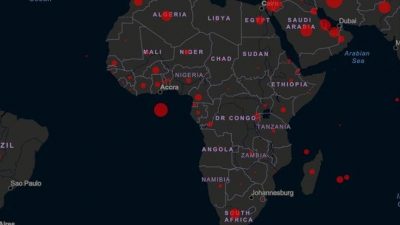Pandemic and Hunger Threaten Africa

The situation of the new coronavirus on the African continent worsens day after day. Although the pandemic has not yet reached its peak of infection in Africa, the figures remain alarming and without due attention from the media and authorities. Adding all the African countries, the number of infected people is already approaching 50 thousand, with almost 2,000 deaths registered in 43 countries (which means 80% of the continent). In fact, the situation has not yet collapsed and in some regions there has even been a little fall in infections – as we can see in the case of South Africa – but the scenario remains worrying, especially if we take into account the cyclical nature of the epidemics. There are, proportionally, only 10 hospital beds for every 10 million Africans, which reveals the total lack of structure to fight the disease.
However, infection itself is not the greatest challenge facing Africans, but an old problem already well known across the continent: misery. Structural hunger and extreme poverty tend to worsen in epidemic settings, being even more worrying in a context of a global pandemic, where food production and circulation are profoundly affected. Africa is the poorest continent in the world, with an extremely fragile food security structure, prone to collapse by any weather. The pandemic comes as the most profound disgrace for Africans, who remain divided between the dangers of infection and hunger.
Deprose Muchena, director of Amnesty International for East and Southern Africa, recently made a series of statements about the hunger situation on the continent in the midst of the pandemic. These are her words: “There are millions of people in South Africa who are at risk and vulnerable to hunger because their income is reduced due to confinement. (…) With such high levels of unemployment and inequality across the African continent, most people actually live on a daily basis, which means they can’t be isolated for another week”. The director stressed the danger that social isolation can pose for these countries, since these sanitary measures tend to take a long time and endanger the entire food production of a country.
As Muchena points out, malnutrition can greatly aggravate the effects of the infection, further weakening the sick and decreasing the immunity of the entire population. There is also the question of other infections that are already structurally plaguing Africa, such as HIV and tuberculosis, which present themselves as comorbidities to the new coronavirus, which can aggravate its effects and lead patients to death. Adding these infections to hunger, the population of all African countries finds themselves in a situation of extreme vulnerability.
Undoubtedly, Africa urgently needs pandemic control measures; however, such policies must be very well thought out and discussed, since the situation in Africa differs completely from the existing scenarios in other regions of the planet where lockdown measures have been adopted. According to Muchena, “it is important that African governments do not copy and capture what they are doing in European countries, but adopt specific response measures that meet the needs of their own population.”
On April 28, the World Food Program (WFP) reported that more than 40 million people in nine African countries are at risk of starvation in the next three months due to the spread of the coronavirus. In addition to the dangers caused by social isolation, there is also the issue of natural pests. Currently, several countries in Africa face a terrible infestation of locusts. These animals destroy all crops and deplete food stocks for the African population, destabilizing the economy and food security. The plague still seems to be far from over. The only way to quickly resolve the infestation is through strong pesticides; however, such products have circulation affected by the pandemic. According to locust expert Keith Cressman, “the plague will last at least until June in East Africa, and maybe even longer, depending on current and future rains (…) There should be (due to the coronavirus and isolation) small delays in delivery of equipment and pesticide”.
The biggest lesson that is clear for the African continent is the urgent need for industrial development, which provides countries in the region with true food autonomy, breaking the link of dependence on foreign relations. Being cruelly victimized by misery and hunger, many African countries survive primarily on donations and “humanitarian aid” by Western nations, which prevent the collapse of these states by awaiting certain benefits as a reward. Such resources have now ceased and the humanitarian aid is no longer provided to Africa. So what will Africans do? We only have to face the crisis and, when everything is over, undertake strong projects of industrialization and income distribution, in order to avoid a new collapse. Africa now realizes that the eternal receipt of humanitarian aid cannot be trusted and that there is no sovereignty without food autonomy.
*
Note to readers: please click the share buttons above or below. Forward this article to your email lists. Crosspost on your blog site, internet forums. etc.
This article was originally published on InfoBrics.
Lucas Leiroz is a research fellow in international law at the Federal University of Rio de Janeiro.
Featured image is from InfoBrics

